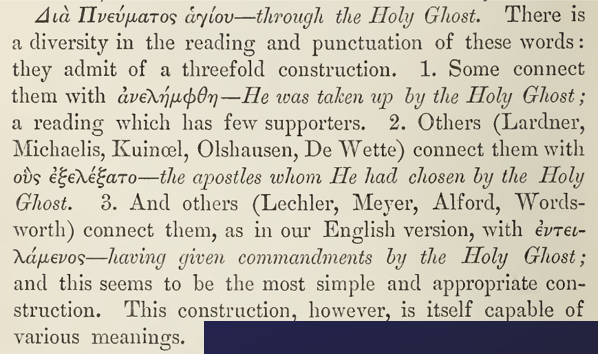
If you had trouble with the endings of θεός then you may want to go back here to review the endings of the class of nouns to which it belongs by clicking .
Having looked at how these case endings are formed, let's circle back around to their function.
Acts 3:9 Everyone saw him walking about and praising God. What form of
the noun for God would you expect to see here?
Acts 1:3 (Jesus) talked about the kingdom of God. What form of
the noun for God would you expect to see here?
Acts 2:7 God says, "This will happen in
the last days". What form of
the noun for God would you expect to see here?
Acts 4:24 When they heard this, they raised their voices to God.... What form of
the noun for God would you expect to see here?
Well done!
Now we can revisit Kimberly's question: How do we know it was Jesus who chose the apostles rather than the Holy Spirit?
Of course, the biblical notions about the nature of the Trinity mean that we cannot use airtight categories for things that Jesus does, as distinct from the Father or the Holy Spirit. All three persons have overlapping functions.
But we are mostly concerned here with how best to render what Luke wrote in verses 1 and 2.
We know that the subject of the clause, the do-er of the verb "chose", is going to be a noun that is in the nominative case. ὁ Ἰησοῦς is really the only nominative case option available to us. πνεύματος ἁγίου is genitive case, so (in terms of the grammar of this verse) is not really possible as the one who did the choosing, since it is not in the proper case to be the subject of the clause (i.e. the do-er of the action of the verb).
Indeed, πνεύματος ἁγίου is bound up in the preposition phrase — like a little self-contained package of meaning — διὰ πνεύματος ἁγίου. This phrase could be rendered:
So there are some options on what to do with this prepositional phrase. To what activity of Jesus ought it be attached? There are two legitimate possibilities.
Making a choice between these two renderings — after we have done our own work of translation as best we can — is a reason for taking a look at a "technical commentary". The ICC commentaries (available from https://guides.library.duke.edu/c.php?g=289359&p=1933919) are an easy place to start. On this verse, the ICC volume on Acts says:

Reading the ICC notes, rather than settling for you the question of how to best render διὰ πνεύματος ἁγίου in this verse, mostly tells you that if you think there are two or three ways to understand this verse, you are not alone.
Good for you!